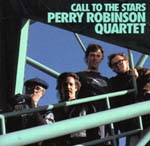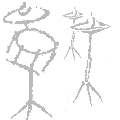|
Call To The
Stars,
the second offering of the Perry Robinson Quartet on West Wind,
is as delightful as a jazz coloring book and as stirring as a dream
journey. Each of these ten pieces burns with a gem-like individuality...
[more]
 Perry
Robinson Quartet - "Call To The Stars" Perry
Robinson Quartet - "Call To The Stars"
Perry Robinson
- clarinet
Simon Nabatov - piano
Ed Schuller - bass
Ernst Bier
- drums
| 1. |
Farmer
Alfalfa |
Henry
Grimes |
7:30 |
| 2. |
Unisphere |
Perry
Robinson |
6:31 |
| 3. |
Henry's
Dance |
Perry
Robinson |
6:12 |
| 4. |
Sinderam
Song |
Darius
Brubeck |
6:47 |
| 5. |
Warp
Factor 9 |
Perry
Robinson |
7:26 |
| 6. |
Perry's
Troika |
Perry
Robinson |
6:24 |
| 7. |
Old
Growth Forest |
Danis
Yerry |
7:32 |
| 8. |
Shu
Bass Blues |
Ed
Schuller |
5:36 |
| 9.
|
Call
to the stars |
Henry
Grimes |
7:30 |
| 10.
|
Perrywinkle
Blue |
Perry
Robinson |
3:36 |
Recorded and
Mastered at CORNET Tonstudio Köln by Thomas Kern
June/ July 1990
 Order this CD.......[order] Order this CD.......[order]
Linernotes
"Call
To The Stars",
the second offering of the Perry Robinson Quartet on
West Wind, is as delightful as a jazz coloring book and as
stirring as a dream journey. Each of these ten pieces burns with
a gem-like individuality. The result, much more than the sum of
its parts, is a sustained ride through a slice of Perry Robinson's
musical universe. And for those unacquainted with "Nightmare
Island", it's an introduction to a group making its mark
in contemporary jazz. "Call To The Stars" is a
blend of the old and the new, the in and the out, and with a modern
clarinet master at the helm, quartet playing at its most highly
evolved.
"Farmer Alfalfa":
Henry Grimes' "Farmer Alfalfa" is named for a cartoon character
and appeared on Funk Dumpling, Perry's 1962 debut LP (recently
reissued). Here the quartet takes the driving, boppish melody to
a country dance. But behind the festive air, in the sly off-centered
chords Simon lays down, there's a strong hint of what we're in for.
"Unisphere":
"Unisphere" is the first of what Perry calls his
"automatic compositions" to be recorded. They derive from
a period beginning in 1963 when Perry was with the U.S. Army band.
He used his time on the banks of the Panama Canal to help develop
the kind of free music that would be flourishing with his return
to the States in 1965. The melody'' lyrical second half came to
him in a flash. Listen especially to the interplay between Ernst
and Simon and then the tug between Ed and Perry.
"Henry's
Dance":
"Henry's Dance" is another of Perry's tributes
to Grimes, one of jazz's greatest bass players. "Ed gives me
the same kind of feeling" says Perry about Schuller, who, it
might be noted, plays a key role in the recording of Charles
Mingus' monumental "Epitaph". Simon's solo
here is packed with allusive wit. The bright, piano-player-like
sound of the spinet used on this number contributes to the kaleidoscopic
effect.
"Sinderam
Song":
Darius Brubeck's "Sinderam Song" projects us into
an altogether different sound space, meditative and, for a while,
reminiscent of a raga. The tune features Simon Nabatov, whose prodigous
pianism was nurtured at the Moscow Conservatory. Perry's overdubbed
clarinet builds musical terraces and just before the return to a
meditative calm there is the feeling of an exuberant march across
an extra-terrestial surface.
"Warp Factor
9":
Ernst Bier's percussion solo is a segue and a take off into "Warp
Factor 9", an automatic composition whose title derives from
'Star Trek'. A touch of sinister is dissolved with the onset of
climax and the trace of a quote from the MJQ's "The Golden
Stryker".
"Perry's
Troika":
Composed in the revolutionary days of late 1989 when the Perry
Robinson Quartet was touring Germany, "Perry's Troika"
is the lashing out of a whip followed by a lovely counter-statement.
The Capricorns
(Simon, Ed and Ernst) steer Perry's Virgo rhythmically shifting
gallop across the barren wastes, headlong into a question mark.
"Old Growth
Forest":
"Whose destiny?" Perry's pun seems to ask. "Old
Growth Forest" may provide an answer. Denis Yerry who wrote
this haunting piece, is a native American composer/pianist Perry
often gigs with in the States. The clarinet rises out of its rich
low register, souring towards the top of the redwoods before falling
to the forest floor. Meanwhile Simon gets low-down.
"Shu Bass
Blues":
Ed Schuller's "Shu Bass Blues" was written especially
for the session as remembrance of bass masters Oscar Pettiford,
Ray Brown, and Jimmy Blanton. Simon lays a blues row
against the bass line, and when Perry enters with a sigh, his horn
sings "I'm in Heaven" momentarily before entering into
the business of this tough-minded blues.
"Call
To The Stars":
Taken from an H.P. Lovecraft story, the title tune "Call
To The Stars" has as its key elements, says Perry, a farmer,
a meteorite, and a message. A procession of augmented chords broken
by a Latin 6/8 on the bridge sets the stage for the impending blast-off.
"Perrywinkle
Blue":
"Perrywinkle Blue" finds Perry peering through
the prism of a tiny crustacean shell, reflecting on his passage
through time. A 7/4 on the main theme shifts on to a 2/4 bridge.
Simon's and Perry's duo is one of the recording's many highlights.
Ed says, "I Got Plenty Of Nothing," the kind of paradox
Perry approves of.
Jim
Cramer
|




